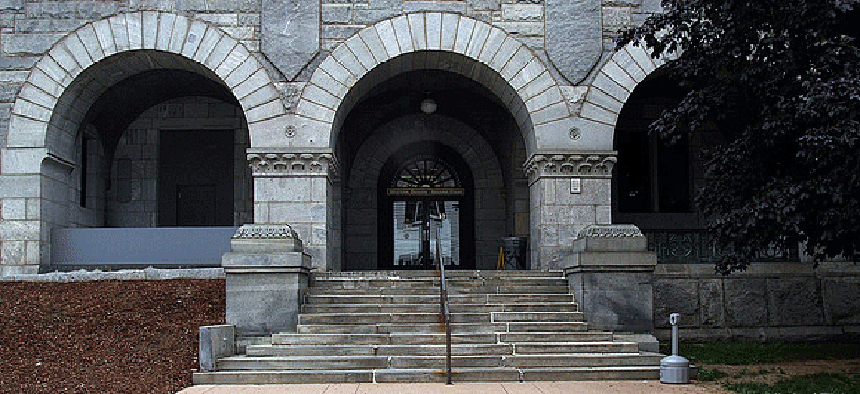Document retrieval slow? It might be all in how you look at it.


Connecting state and local government leaders
Online processes were slowing down in Hampden County's registry of documents, which date back to 1636. An any-format viewer solved the problem.
Hampden County in Massachusetts has seen a lot of American history. Officially founded in 1812 when it was split off from it's now northern neighbor, Hampshire County, it actually existed in one form or another since 1636. In the year 1777, its city of Springfield served as the armory for the bulk of George Washington's rebel forces in the Revolutionary War.
Today, Hampden is an even busier place, one the most industrialized counties of western Massachusetts. The 2010 census found 461,228 residents living in 175,288 households. Whenever any of those houses or plots of land change hands, documents need to be created to record the transaction. It's the job of the country register to keep it all straight.
"There are 175 different kinds of documents that we record and track," said Donald Ashe, the register for Hampden County. "Everything from deeds, mortgages and liens are online now. And new types are being created all the time."
Besides documents related to recent transactions, the county maintains records going all the way back to 1636. From a historical perspective, those old documents can provide a fascinating look at the lives of some of the biggest players in American history, making them an invaluable resource for genealogy researchers.
Ashe said that Hampden County is always on the cutting edge in terms of technology. In fact, the county had its records online years before most others.
But with 100,000 documents being processed every year, and researchers clamoring to dive deep into the files for historical projects, trouble was beginning to brew.
"Things started to slow down," Ashe said. "For both people inside government and for the public, everyone was seeing it. We even started getting complaints. I had to ask how we could solve the problem."
According to Ashe, the county’s own IT department couldn't figure out what was wrong, other than too many people were trying to use the system, calling up documents in a variety of formats for both modern legal reasons and for historical records. Not wanting to see the system bogged down by intolerable slowness, Ashe set out to try and fix the problem.
He engaged Snowbound Software, a document viewing and conversion company that was conveniently located close by in Waltham, Mass. The company offers two main programs. The first is called RasterMaster, and is used as an engine that can convert almost any document into any other -- and can do it in large batches. The other product is called VirtualViewer, which allows viewing of any document regardless of the source file.
Snowbound CEO Simon Wieczner said he wasn't surprised that Hampden County was interested in the viewer program, because it allows viewing and manipulation of records without actually changing the source itself, an important consideration for both legal and historical records. A document viewed by VirtualViewer can be rotated, zoomed in, paged through and even printed, regardless of the original file type. In fact, users don’t even have to know what format the viewed document is stored in to work with it.
"The advantage to VirtualViewer is that it can display documents in HTML and HTML5 within the viewer," Wieczner said. "And it works on any platform, even mobile. All you need is a browser."
On the back end, Wieczner said all that is needed to run the software is either a Windows server running .Net or any server running Java. The viewer can pull up almost any file, including those made in Microsoft Office, as well as JPEGs, TIFFs, PDFs and most proprietary formats. And because the viewer simply loads up the document for viewing, users are able to look at any document in a system. It doesn't matter if, for example, they need to see an Excel spreadsheet but don't have access to the Office suite.
And, users aren't pulling down computing power by loading a variety of disparate viewing programs on the server end, which Wieczner suspects might have been what was slowing things down in Hampden.
Nobody really ever found out what was causing the terrible slow-down, not officially anyway. But Ashe said he doesn't mind, because the Snowbound VirtualViewer fixed the problem. VirtualViewer starts at $5,000 and is dependent somewhat on options and numbers of users in the deployment. Hampden's implementation included the base model plus some distribution costs.
Ashe said it took about two months to get everything up and running. Once implemented, the difference was easy to spot. "Everything sped up right away," Ashe said. "And the documents look much clearer when called up with the new VirtualViewer too. We don't get complaints anymore."
In fact, Ashe said he recently got a letter from a woman in England who was doing a genealogy search, just to say thank you for providing the records she needed in an easy-to-access format. He also said that as many as four authors have visited the archives to research books, but since the records are available for anyone to use online, that number of authors using the system could be much higher.
Ashe said he was happy with the way things are running now. The registry is working at peak efficiency again. And in the future, even if more document types beyond the 175 different ones in the system now are added, they can be accessed using VirtualViewer without any extra effort. Just to be on the safe side, the county created a video showing residents how to use the enhanced search features, though with the intuitive and quick new interface, it may not actually be needed.




